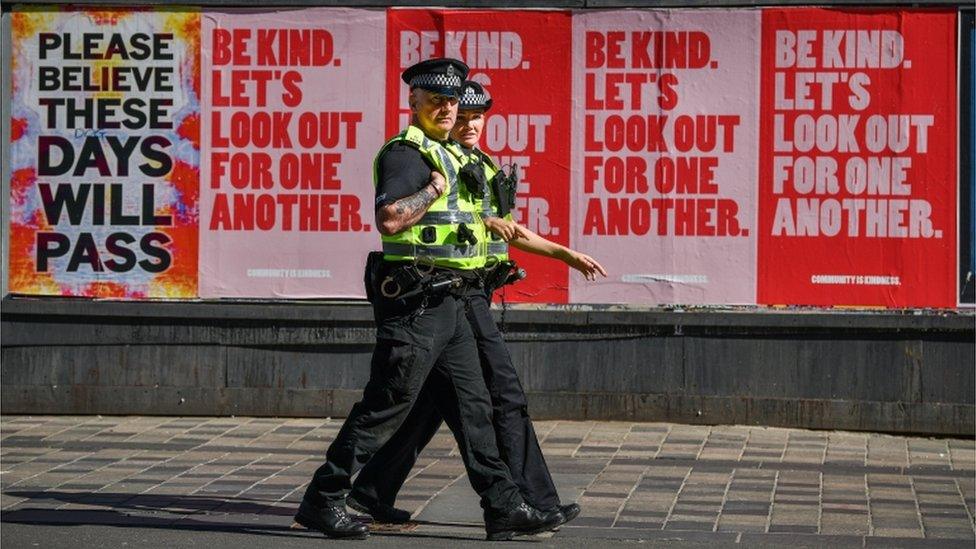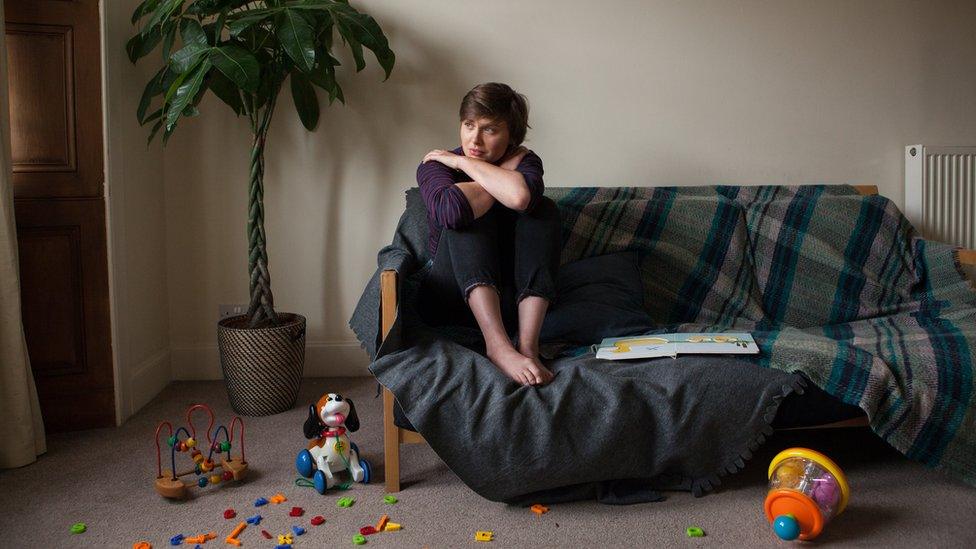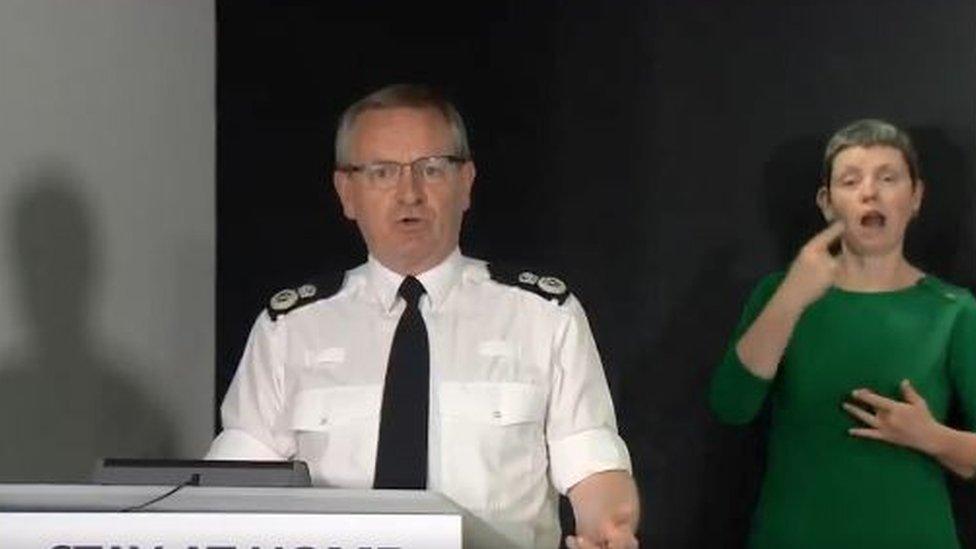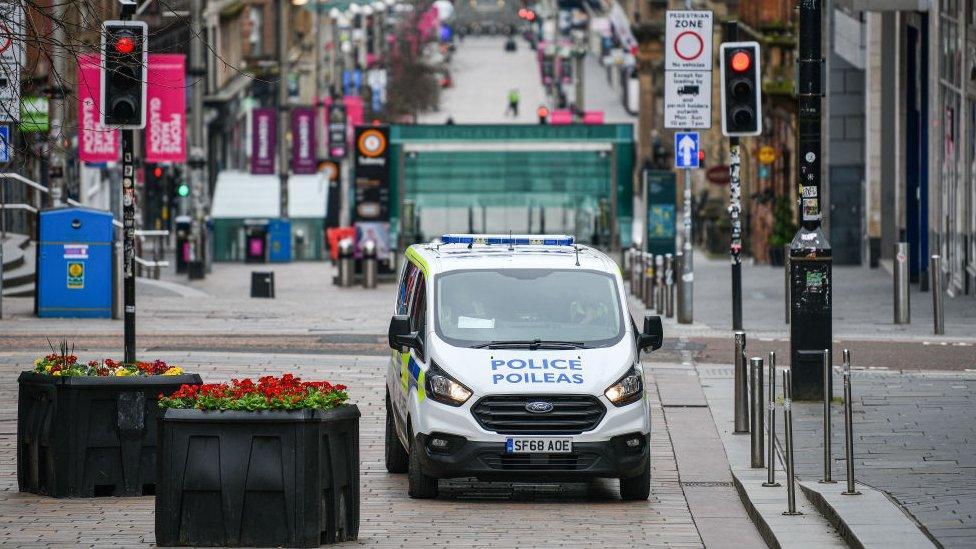Marginal rise in recorded crime across Scotland
- Published

The National Statistics bulletin said the Covid pandemic will have a "significant impact" on the 2020/21 figures.
Recorded crime increased marginally in Scotland last year despite almost 1,700 new domestic abuse offences.
Just 36 more crimes were recorded in 2019/20, according to a National Statistics bulletin.
Emergency legislation brought to deal with the Covid pandemic resulted in 107 offences in the first weeks of lockdown.
But the report predicted the virus would have a "significant impact" on the 2020/21 figures.
Justice Secretary Humza Yousaf said the response to the new domestic abuse legislation, which criminalises coercive and controlling behaviour, showed victims were more confident about coming forward.

The report, Recorded Crime in Scotland 2019/20, external, also found:
A total of 246,516 crimes were reported by Police Scotland, up less than 1%. This compares to the record of 572,921 in 1991.
Crimes of dishonesty fell by 3% but still accounted for 45% of all recorded crime.
The number of homicides increased by 19%, from 102 to 121. The biggest contributor was a rise in driving-related deaths.
Non-sexual crimes increased by 16%, as a result of the new domestic abuse legislation which was responsible for 1,681 crimes.
Sexual crimes decreased by 1% - the first fall since 2008/09 - although they remain at an almost 50-year high.
There were 451 recorded crimes per 10,000 population in 2019-20. The highest rates recorded were Glasgow City (680), Dundee City (645) and Edinburgh City (579).
The report also showed the police clear-up rate for total recorded crime increased by 0.6% to 51.5%.
Emergency legislation passed at the end of March resulted in new offences related to the nationwide lockdown.
Officers recorded 107 Coronavirus restrictions crimes, including 35 in Glasgow City, 15 in South Lanarkshire and 11 in South Ayrshire.
In April, Police Scotland said overall crime was down by a quarter since lockdown but, in June, Chief Constable Iain Livingstone said it had returned to normal levels.
But since then further restrictions have been introduced, including a ban on household gatherings and a 22:00 curfew for the hospitality sector.
Police Scotland's latest quarterly performance report, external, which covers April to June, notes: "The true impact of the Covid-19 pandemic on crime and offence level in Scotland may not be known for some time."
Home removal powers
The new domestic abuse legislation enables police and prosecutors to better pursue abuse involving coercive and controlling behaviour.
Mr Yousaf said: "I am pleased that victims of domestic abuse have confidence in the collective actions of Scotland's police and wider justice and third sector partners, to come forward and report these cases.
"We must learn from our success in reducing violence on our streets to help keep people safer in their homes, in particular those who are subjected to, or at risk of, domestic abuse."
He said that required not only a government response, but a "commitment across families, friends, and colleagues to help tackle the attitudes and behaviours that allow any form of domestic abuse to persist".
He added that MSPs would soon consider further legislative plans to give police and courts powers to remove domestic abusers from victims' homes.
'Soft-touch'
Scottish Conservative justice spokesman Liam Kerr called on the Scottish government to do more to address the issues highlighted in the statistics.
He added: "Violent crime has soared under the SNP's soft-touch justice system, and these new figures show no sign of that changing.
"Victims have been let down repeatedly and our police officers are not receiving the backing and resources they need from the SNP government."
However, the Scottish government said violent crime was "significantly lower" than it had been a decade ago.
Will Linden, deputy director of the Scottish Violence Reduction Unit, said the figures showed progress had been made but added that there was a need for "constant vigilance".
Mr Linden highlighted an 8% rise in handling offensive weapons, up from 8,896 to 9,644.
"Any reported increase in weapons carrying must be taken seriously," he said.
"While we have seen big decreases in young people carrying knives, they are still one of the groups most at risk of this behaviour.
"We will look closely at the data to discover any possible trends that may be developing, but crucially we must redouble our efforts with those most at risk of becoming involved in a violent lifestyle."
- Published5 June 2020

- Published25 May 2020

- Published26 April 2020

- Published1 February 2018
